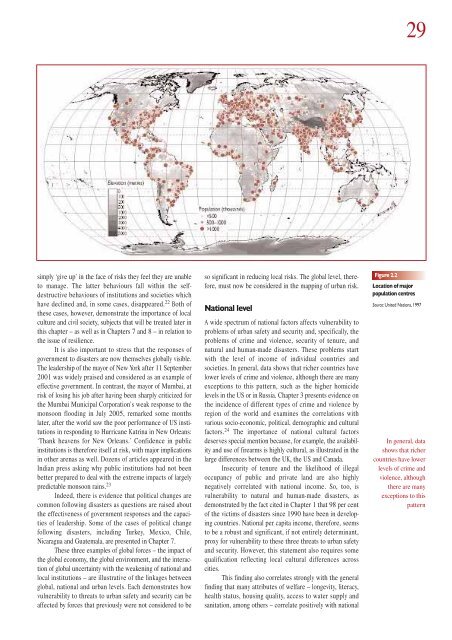Global Report on Human Settlements 2007 - PoA-ISS
Global Report on Human Settlements 2007 - PoA-ISS
Global Report on Human Settlements 2007 - PoA-ISS
You also want an ePaper? Increase the reach of your titles
YUMPU automatically turns print PDFs into web optimized ePapers that Google loves.
29<br />
simply ‘give up’ in the face of risks they feel they are unable<br />
to manage. The latter behaviours fall within the selfdestructive<br />
behaviours of instituti<strong>on</strong>s and societies which<br />
have declined and, in some cases, disappeared. 22 Both of<br />
these cases, however, dem<strong>on</strong>strate the importance of local<br />
culture and civil society, subjects that will be treated later in<br />
this chapter – as well as in Chapters 7 and 8 – in relati<strong>on</strong> to<br />
the issue of resilience.<br />
It is also important to stress that the resp<strong>on</strong>ses of<br />
government to disasters are now themselves globally visible.<br />
The leadership of the mayor of New York after 11 September<br />
2001 was widely praised and c<strong>on</strong>sidered as an example of<br />
effective government. In c<strong>on</strong>trast, the mayor of Mumbai, at<br />
risk of losing his job after having been sharply criticized for<br />
the Mumbai Municipal Corporati<strong>on</strong>’s weak resp<strong>on</strong>se to the<br />
m<strong>on</strong>so<strong>on</strong> flooding in July 2005, remarked some m<strong>on</strong>ths<br />
later, after the world saw the poor performance of US instituti<strong>on</strong>s<br />
in resp<strong>on</strong>ding to Hurricane Katrina in New Orleans:<br />
‘Thank heavens for New Orleans.’ C<strong>on</strong>fidence in public<br />
instituti<strong>on</strong>s is therefore itself at risk, with major implicati<strong>on</strong>s<br />
in other arenas as well. Dozens of articles appeared in the<br />
Indian press asking why public instituti<strong>on</strong>s had not been<br />
better prepared to deal with the extreme impacts of largely<br />
predictable m<strong>on</strong>so<strong>on</strong> rains. 23<br />
Indeed, there is evidence that political changes are<br />
comm<strong>on</strong> following disasters as questi<strong>on</strong>s are raised about<br />
the effectiveness of government resp<strong>on</strong>ses and the capacities<br />
of leadership. Some of the cases of political change<br />
following disasters, including Turkey, Mexico, Chile,<br />
Nicaragua and Guatemala, are presented in Chapter 7.<br />
These three examples of global forces – the impact of<br />
the global ec<strong>on</strong>omy, the global envir<strong>on</strong>ment, and the interacti<strong>on</strong><br />
of global uncertainty with the weakening of nati<strong>on</strong>al and<br />
local instituti<strong>on</strong>s – are illustrative of the linkages between<br />
global, nati<strong>on</strong>al and urban levels. Each dem<strong>on</strong>strates how<br />
vulnerability to threats to urban safety and security can be<br />
affected by forces that previously were not c<strong>on</strong>sidered to be<br />
so significant in reducing local risks. The global level, therefore,<br />
must now be c<strong>on</strong>sidered in the mapping of urban risk.<br />
Nati<strong>on</strong>al level<br />
A wide spectrum of nati<strong>on</strong>al factors affects vulnerability to<br />
problems of urban safety and security and, specifically, the<br />
problems of crime and violence, security of tenure, and<br />
natural and human-made disasters. These problems start<br />
with the level of income of individual countries and<br />
societies. In general, data shows that richer countries have<br />
lower levels of crime and violence, although there are many<br />
excepti<strong>on</strong>s to this pattern, such as the higher homicide<br />
levels in the US or in Russia. Chapter 3 presents evidence <strong>on</strong><br />
the incidence of different types of crime and violence by<br />
regi<strong>on</strong> of the world and examines the correlati<strong>on</strong>s with<br />
various socio-ec<strong>on</strong>omic, political, demographic and cultural<br />
factors. 24 The importance of nati<strong>on</strong>al cultural factors<br />
deserves special menti<strong>on</strong> because, for example, the availability<br />
and use of firearms is highly cultural, as illustrated in the<br />
large differences between the UK, the US and Canada.<br />
Insecurity of tenure and the likelihood of illegal<br />
occupancy of public and private land are also highly<br />
negatively correlated with nati<strong>on</strong>al income. So, too, is<br />
vulnerability to natural and human-made disasters, as<br />
dem<strong>on</strong>strated by the fact cited in Chapter 1 that 98 per cent<br />
of the victims of disasters since 1990 have been in developing<br />
countries. Nati<strong>on</strong>al per capita income, therefore, seems<br />
to be a robust and significant, if not entirely determinant,<br />
proxy for vulnerability to these three threats to urban safety<br />
and security. However, this statement also requires some<br />
qualificati<strong>on</strong> reflecting local cultural differences across<br />
cities.<br />
This finding also correlates str<strong>on</strong>gly with the general<br />
finding that many attributes of welfare – l<strong>on</strong>gevity, literacy,<br />
health status, housing quality, access to water supply and<br />
sanitati<strong>on</strong>, am<strong>on</strong>g others – correlate positively with nati<strong>on</strong>al<br />
Figure 2.2<br />
Locati<strong>on</strong> of major<br />
populati<strong>on</strong> centres<br />
Source: United Nati<strong>on</strong>s, 1997<br />
In general, data<br />
shows that richer<br />
countries have lower<br />
levels of crime and<br />
violence, although<br />
there are many<br />
excepti<strong>on</strong>s to this<br />
pattern

















